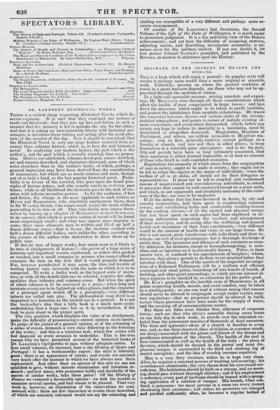DR. LARDNER'S HISTORICAL WORKS.
THERE is a critical slang. respecting Historical Novels, which de- serves exposure. It is said that they confound our notions of truth and falsehood ; that they mix up fact awl fiction, in such a manner that the memory is led to mistake the one for the other;• and that it is taking an unwarrantable liberty with historical per- sonages, to introduce them talking awl acting after the good plea- sure of the novelist of the day. Now it should be remarked, that the Historical Novel is only one stage further removed from ac- curacy than ordinary history, which is, in fact, the real historical novel. In analyzing any modern history, tile part which is the author's, and the part which is actually recorded, bear no propor- tion. Motives are attributed, schemes developed, scenes sketched, air and manner described, and characters discussed, none of which exist elsewhere than in the author's brain; of which, perhaps, a general impression may have been derived from the consideration of monuments, but which are as much creation and more, though not of so bold a kind, as the last popular historical novel. Proba- bility is in favour of the novelist, who goes upon the broad prin- ciples of human nature, and who usually excels in re-living past times; while in all likelihood the historian goes to the task of cre- ation with inferior inventive powers. As for the confusion of fact and ,fiction, the charge is far more applicable to such writers as HumE and ROBERTSON, who absolutely amalgamate them, than to Sir WALTER SCOTT, who Comes much nearer the truth without pretending to be true at all. They who doubt, may amuse them- selves by tracing up a chapter of ROBERTSON Or even SCHILLER to its sources: that which is positive matter of record will be found most surprisingly small ; and what may appear more singular to some, these same elements may be written and filled up half a dozen different ways,—that is to say, the skeleton clothed with half a dozen different bodies, each unlike the other, according to the animus of the author who undertakes to dress them up for public view. If this be true of larger works, how much more is it likely to be true of abridgments of history ?—the précis of a long series of intricate and important events, condensed, or rather often packed or crushed, into a small compass by persons who cannot afford to consume the time on the task that it would properly demand. For, however paradoxical it may seem, the time and trouble of writing history vary inversely with the scale on which it is to be composed. To write a bulky work on the largest scale of narra- tive, or with all the details that can be selected, requires few other qualities than industry and common sense. But when the spirit of whole volumes is to be conveyed in a page,—when long and intricate events are to be lighted up with a glance, and the character of a principal agent struck off in a paragraph,—very different talents are called into play. The philosophical coup dmil is as important to a historian as the tactical eye to a general. It is not the bookseller's idea that a little book is a much more costly undertaking than a large one; but so it is, nevertheless, if the task be gone about in the proper spirit. The very qualities which heighten the value of an abridgment, make the difficulty of pronouncing a correct opinion on its merits. To judge of the justice of a general opinion, or of the colonring of a series of events, demands a very close following in the footsteps of the writer; and this is a laborious task, which few critics will feel disposed on every occasion to undertake. This is the true reason why we have permitted several of the historical books of Dr. LARDNER'S Cyclopeedia to pass without adequate notice. In four small volumes, for instance, here is the History of Spain and Portugal : it has a workmanlike aspect ; the style is tolerably -good ; there is an appearance of labour; and events are narrated very much after the manner in which we have always seen them represented. Any other than an opinion of this sort we are not -qualified to give, without minute examination and laborious re- march ; and how many, who pronounce boldly and decidedly of the merits of similar works, take these pains ? Of the History of Fiance we ventured a favourable opinion : we took the trouble to oramine several epochs, and had reason to be pleased. That very work is, however, an illustration of the observations we com- menced with : there are few characters or events there described, of which one minutely informed would not say the colouring and shading are susceptible of a very different and perhaps more ac- curate arrangement. Of another of Dr. LARDNER'S last livraisons, the Second Volume of the Life of the Duke of Wellington, it is much easier to pronounce judgment. It is a fair and lively view of the Duke's achievements ; and yet here the difficulty of assigning motives, adjusting merits, and describing movements accurately, is im- mense, even for the military student. If any one doubts it, let him peruse Colonel NAPIER S pamphlet, just published by the BoolvEs, in answer to strictures upon his History.


























 Previous page
Previous page